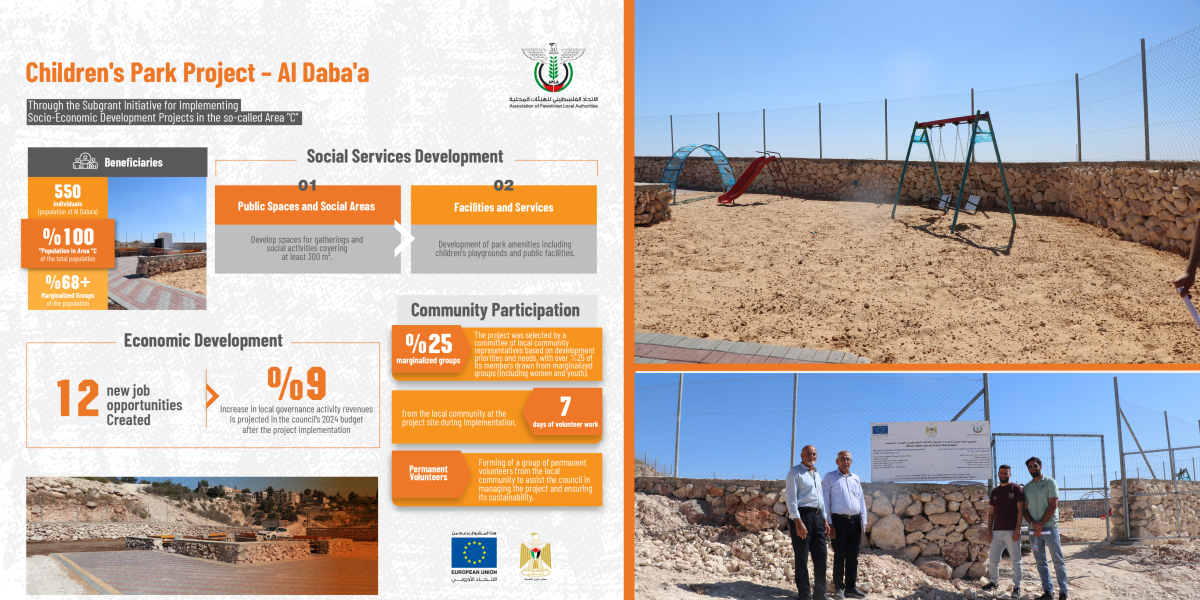Al Daba'a | Children's Park Project
Magharat ad-Dab‘a is a Palestinian village tucked deep within the Qalqiliya Governorate—isolated and enclosed by the separation wall, as though pushed to the edge of the map, yet still holding on. The wall has severed its connection to neighboring villages, narrowed its access points, and left it to face—alone—every obstacle standing in the way of its residents’ most basic rights. The village spans nearly 1,599 dunums of land, of which only 99 are inhabited. The rest remains untouched, waiting for opportunities that rarely reach its path.
In this context of isolation and marginalization, the need for a shared public space emerged—not as a luxury, but as a pressing necessity. In a village devoid of recreational areas, where children are denied safe places to play, interact, and grow, the idea of a playground was not optional—it was vital.
Al-Dab‘a Park Project was developed as a direct response to this need. A seemingly simple initiative on the surface, it carried within it deeper implications of belonging, access to space, and social cohesion. The project’s priorities were shaped through local consultations with residents from various segments of the community. It was agreed that the playground would be an open and inclusive space, not a restricted facility with limited use.

From the outset, the project was neither imposed nor pre-designed. The local community played a foundational role in shaping it—through planning, implementation, and follow-up. Participation was not symbolic; it was tangible and hands-on, evident in choosing the location, designing the space, and contributing to its setup and construction.
Young people took on leading roles, while women contributed significantly to community coordination. The project became an opportunity to revitalize collective action within the village. A volunteer team was formed to support the playground’s management after its completion—reflecting a genuine commitment to long-term sustainability, rather than short-term achievement.
The park has since redefined the concept of public space in Dab‘a. It has become a natural meeting point for families, a safe environment for children, and a shared community space. In a village that long lacked any open facilities, it provided a place for local events, informal gatherings, and daily social interaction outside confined walls.
Though modest in scale, the project’s impact extended far beyond its physical footprint. It contributed to rebuilding trust among residents and reinforced a sense of ownership and collective responsibility over public infrastructure.
While the project was not primarily economic in nature, its implementation did create temporary job opportunities within the village and expanded the role of the local council in managing a new community facility. Moreover, it helped activate a broader conversation around the potential for locally managed public spaces—introducing a simple, scalable model for future replication.

This project is part of the Sub-Grant Program, which is implemented by the Association of Palestinian Local Authorities (APLA) in Area C. The initiatives under this program are not merely about infrastructure improvement, but serve as practical tools to keep communities rooted in their land, expand spaces of life in the face of closure and confiscation, and turn development into a daily act of resilience that safeguards rights, memory, and existence.
funded by: the European Union and the Swiss Agency for Development and Cooperation (SDC)

 Key Indicators
Key Indicators
 Cultural Heritage
Cultural Heritage
 Public Parks
Public Parks
 Renewable Energy
Renewable Energy
